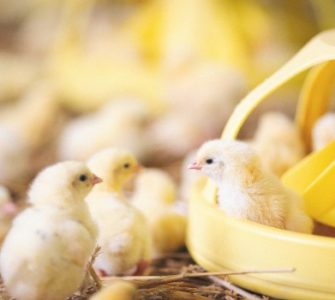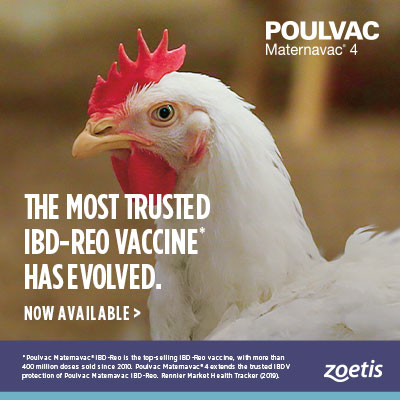Periodic IBV PCR testing is key to ensuring vaccination efficacy
Complexes should regularly evaluate the infectious bronchitis viruses (IBV) prevalent on their farms to help determine which vaccines can provide the best protection possible.
IB is primarily an upper respiratory tract disease that is most commonly associated with respiratory problems, but it can cause other issues like egg drop, for example, in laying hens.
There are several strains of IBV, and they are typically named after the region where they were first discovered.
A single vaccine tends to target a particular strain, though they can give cross-protection when given in combination, and are usually administered as a spray in broiler hatcheries.
In order to best protect birds, it is important to choose a vaccine, or combination of vaccines, based on the prevalence of different strains in the area and on the farm itself, Kalen Cookson, DVM, Zoetis director of clinical research, told Poultry Health Today.
“Luckily, we have more tools available to us now than we ever had. So we’ve got traditional virus isolation,” he said. “[But more often] today, people are using direct PCR (polymerase chain reaction) to define what their birds are getting exposed to. That’s been a real asset to the industry.
“And so basically people can do surveys at strategic times of the year, usually before the next winter season, to get an idea of what’s in general circulation in their birds.”
Cookson said that the DMV/1639 strain had established itself across much of the “broiler belt” of the US — broadly speaking, the agricultural eastern half of the country.
But there were also other virus strains in circulation, such as Georgia 98 or Georgia 13.
Developing a vaccination plan to best cover each farm is therefore important, Cookson said. “You want to make sure the most prevalent strains that your birds are being exposed to are being addressed in your vaccine program.
“Based on that information, you’ll come up with usually two or three different serotypes that you’ll have in your program. And it may vary by season, as well.”
A Massachusetts vaccine is often a good starting point, Cookson explained, before others are considered based on the environment.
“[With Massachusetts] there’s not a lot of ambiguity in the bird’s immune response, so they recognize that serotype very readily.
“They can respond to it very well and consistently. You can get good take with the vaccine and you get good clearance, which is usually a very good thing.”
The work that Cookson presented at the 2020 American Association of Avian Pathologists’ meeting looked at how combinations of different vaccine strains could offer IBV cross-protection. In particular, it considered how to confer protection against DMV/1639.
It was the first time that all possible combinations of Massachusetts, GA98 and GA08 had been compared to examine cross-protection against DMV/1639. While bivalent combinations, especially Mass + GA08, gave decent cross protection against a very strong DMV/1639 challenge, the trivalent application proved most successful.
“Compared to those bivalent combinations, it was head and shoulders more protective on both indices — on both histological protection of the tracheas, and on shutting down viral infections and shedding in the tracheas,” he said.
“So that was the other major message of that study — the trivalent combination,” he added.
“So, if you’re in a really high-challenge 1639 environment — especially in the wintertime when everything gets concentrated more, less ventilation — the trivalent could be the better alternative, especially if you’re on, say, a Mass-GA08 program and you’re still having a little bit of challenge that it’s not addressing.”
All trademarks are the property of Zoetis Services LLC or a related company or a licensor unless otherwise noted.
©2021 Zoetis Services LLC. All rights reserved. BIO-00318
Posted on September 9, 2021














